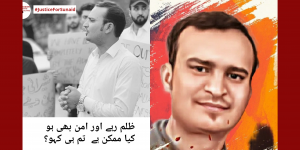Aurat march is that time of the year when the regressive patriarchal forces are increasingly visible in Pakistan. Their mission? To stop women from sponsoring immorality in our very own Islamic Republic of Pakistan. The Islamic Society in which daughters are not given their due share in inheritance, where wives are beaten up, sometimes murdered if they birth girls, where they are not given their dower, where little girls are forcefully converted, married off to men thrice their age, women are thrown acid at, killed in the name of honour, their right to divorce snatched, and where every hour a woman gets raped. Dozens of kids fall prey to sexual assault each day.
So yes, the women who dare to come out of their homes, holding placards and chanting peace, must be pelted with stones, and if that doesn’t teach them a lesson, false cases of blasphemy should be fabricated against them. Or maybe casting a slur on them in a national newspaper would do them good. And when even that’s not enough, society should wholly endorse the Taliban giving them death threats. These women who speak for the voiceless, who refuse to be silenced anymore, have committed blasphemy, blasphemy against the order of the patriarchy.
Hardly any issue occupies as much space in the consciousness and debates of fundamentalism as the question of gender. A significant portion of Fundamentalist movements, may they be Christian, Hindu, or Muslim, centres around the role of women; their character, dressing, behaviour, and mighty power to seduce innocent men.
Many think that religious extremism in Pakistan was born under military dictator Zia-ul-Haq. But the truth is, it had been in the air long before. Islamization by the Dictator helped secure it from the air and planted it in this nation’s heart. His successors faithfully watered the beloved seed, and now after four decades, the Oak of fundamentalism stands tall with roots in every corner of the country ubiquitously.
The fragility of our culture and religion lies on the shoulders of women. They are told that they are beings of lower aptitude, and the only way they can please God is through the servitude of their husbands. If any calamity befalls, the women are blamed for causing it. When men realise that they have very little control over their living conditions, they try dominating women to preserve male dignity. The control of women comes to signify a means to cure a whole range of society’s political, economic, and cultural problems.
Despite being half the population, women form a politically weak entity. The women who manage to enter the political arena are always linked, by marriage or blood, to powerful male politicians. Women make an easy target for fundamentalists. Not long ago, the Council of Islamic Ideology (CII) proposed that it was okay for men to beat their wives if they refused sexual intercourse under the women protection bill (talk about ironies!). The provincial government in KPK tried to force abaya on all the female students under the garb of piety and for their ‘protection’ from sexual harassment.
Reproductive rights in Pakistan are already next to nothing. Through years of conditioning, the far-Right has made sure that women’s existence is confined to the capacity of their wombs. This leaves us with one of the highest maternal mortality rates in the world and the business of unsafe off-the-book abortions blooming.
Patrolling women’s bodies became a new trend to gain market gains in the corporate world when Faisal Bank made it compulsory for all the women employees to wear black abayas and cover their heads because, in the Islamic State bank, employees should follow the Islamic dressing. Implementing the actual principles of Islam and banning interest was out of the question. Thus, this show of optics worked very well since our society’s collective fixation with women’s bodies.
One clever tactic is tying fundamentalism with nationalism. Therefore, it is women who must preserve national heritage and cohere to Islamic customs when it comes to our national dress. Women, who are the daughters and mothers of the soil (the only respectable identity), have to safeguard the values of the Islamic Republic of Pakistan, shunning the vulgar Western dress code. This Western vulgarity, on the other hand, can be adopted by men without consequences.
When it comes to women, fundamentalism is pretty uncomplicated. Women should cover themselves up and hide the seductive curves of their bodies in layers of black shrouds if they may. When even that doesn’t stop them from alluring men, they must lock themselves up in homes, away from the male gaze. And if they still manage to tempt any righteous man to assault them sexually, society should shame and condemn such women. For, men can’t be held liable.




